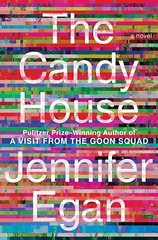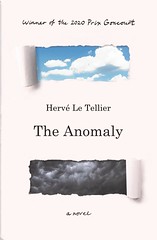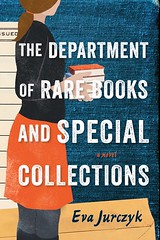“Nothing is free! Only children expect otherwise even as myths and fairy tales warn us: Rumpelstiltskin, King Midas, Handsel and Gretel. Never trust a candy house! It was only a matter of time before someone made them pay for what they thought they were getting for free.”
— Jennifer Egan, The Candy House
 The Candy House (Goon Squad #2)
The Candy House (Goon Squad #2)
by Jennifer Egan
![]()
This is my book club’s selection for August 2022. We previously read (and loved) Egan’s “Manhattan Beach,” and I recalled being very impressed with “A Visit from the Goon Squad,” so I was looking forward to reading “The Candy House.” The anticipation was amply rewarded.
This, from my 2011 review of “Goon Squad,” seems worth repeating:
[A Visit from the Goon Squad] could be a collection of short stories, for each chapter can stand on its own, but it’s actually the coherent narrative of several lives involved in the music industry from the punk rock era into the near future, 2020 or so. The story is not told from one point of view, or chronologically, but it adds up in a very satisfactory manner. Perhaps the most remarked upon chapter is told by one character’s teenaged daughter in the form of a Powerpoint presentation, but really, to me every chapter was brilliant.
Many reviewers remark on Egan’s use of characters from the earlier novel in this new one. What strikes me more is Egan’s continued development of themes and ideas introduced in Goon Squad and the mix of narrative styles and points of view she used there (so different from the style of “Manhattan Beach”), particularly two chapters toward the end:
– Lulu’s “field notes,” which the reader quickly realizes is the real-time realization of a perilous espionage mission
– The chapter that follows, composed of text messages, phone logs, and emails between ever-expanding groups of characters that ties them all together, and is itself the real-time construction of an elaborate and multi-layered scheme to bring them all together
Each of these chapters, to me, was a narrative tour de force, and the novel could have ended on the second one, but I appreciated the couple of short character-amplifying chapters that followed, especially the one about middle-son Ames, whose story was in danger of being forgotten.
In my earlier review of Goon Squad, I compared Jennifer Egan to Jonathan Franzen, and voiced the hope that between the two of them the Great American Novel will finally be written. I haven’t backed down on that hope.
“Manners are not like bonbons, Nina. You may not choose the ones that suit you best; and you certainly cannot put the half-bitten ones back in the box.”
— A Gentleman in Moscow
 A Gentleman in Moscow
A Gentleman in Moscow
by Amor Towles
![]()
I don’t believe there’s ever been an aristocrat without flaws. Behind whatever charm they may possess lurks a Prince Andrew or worse. I don’t believe any totalitarian state, let alone the Soviet state, would have allowed a Former Person to live unmolested in a grand hotel in its capital city. I don’t believe Count Rostov was able to elude informers and the secret police by hiding in the countryside. I don’t believe one damn thing in this novel.
And yet I surrendered to it. I surrendered to its sweetness and charm, devouring every page, every paragraph, every word. Never again will I make snide remarks as my wife immerses herself in a royalty-comes-to-America Hallmark movie, because had a toilet backed up and overflowed while I was reading “A Gentleman in Moscow,” I would have put my feet on an ottoman to keep my socks dry while ignoring the smell and continuing to read. Damn, this Towles fellow can cast a spell.
I read a library e-copy. It then came due and disappeared from my Kindle. So I did something I’ve never done before … I bought a paperback copy from Amazon so I can read it again some day, and perhaps share it with my wife (who really does go all gooey over royal-themed Hallmark movies).
As besotted as I am with this novel, I can’t help comparing it to some of the earlier Alan Furst novels of life under Nazi occupation, some of which followed Count Rostov-type characters as they engaged in resistance and sabotage. The Furst novels are far more realistic and believable, yet they too have their charms.
But yeah, “A Gentleman in Moscow” is a killer read, and one I’ll never forget.
“God, but stupidity oozes from every corner of a religious mind. Every conviction is a thorn in the side of intelligence.”
— Hervé Le Tellier, The Anomaly: A Novel
 The Anomaly: A Novel
The Anomaly: A Novel
by Hervé Le Tellier
![]()
I quite enjoyed this one. Especially the ending, which (unlike many reviewers on Goodreads) I did not find mysterious at all. I remember a science fiction short story from the 1950s, just an idea with the barest minimum of world-building and characterization, in which a man becomes convinced his life is a simulation and at some point the omniscient narrator takes us backstage into a control room with ranks of monitors and people in white lab coats and someone says “abort Simulation 2.5a and initiate 2.5b.” Only here, I suspect, the Trump-like president (for it is surely he) inadvertently turns the simulation off. For all of us.
Did I say I enjoyed this one? I really did, and I read it fast, unable to put it down for long. This is the idea fleshed out, and fleshed out well, with realistic situations and characters, with a mix of humor (especially Protocol 42), seriousness, and wonder. Good stuff, start to finish.
“He felt as if he’d dived into a deep, clear lake and discovered it was a shallow, knee-deep pond. What did you do? Well, you stood up. You rinsed your mud-caked knees and pulled your feet out of the muck. And you were more cautious after that. You knew, from then on, that the world was a smaller place than you’d expected.”
— Celeste Ng, Little Fires Everywhere
 Little Fires Everywhere
Little Fires Everywhere
by Celeste Ng
![]()
“Little Fires Everywhere” is my book club’s selection for September. I’m looking forward to the discussion.
For myself, I’ll say I was immediately engaged by the story and enjoyed the read. It’s reminiscent of a sibling-heavy, adults-with-hidden-lives Jonathan Franzen novel, but with lighter, somewhat shallower characters (except for Pearl, Mia, and Izzy, who are more fully realized).
I thought some of the plot developments contrived and unrealistic (the ease with which Elena gets the scoop on Mia’s background, for example, or learns the names of patients at a local clinic, the resolution of Bebe and Mai Lin’s story). Still, a most satisfactory novel.
I had a library copy and had to give it back, but I know my wife will enjoy the story and will probably buy a copy for her. I will definitely check out the TV adaptation on Hulu.
“There’s this myth that dogs go away to be alone when it’s time for them to die so that they can spare the pack the sadness of their death. It isn’t true. If a dog goes into hiding when it becomes ill, it does so to avoid becoming a target for other animals when it can’t protect itself. A dying dog doesn’t hide out of compassion. It does so out of fear.”
— Eva Jurczyk, The Department of Rare Books and Special Collections
 The Department of Rare Books and Special Collections
The Department of Rare Books and Special Collections
by Eva Jurczyk
![]()
Early in my reading, there were moments when I was ready to put this novel aside and move on, so impatient was I with Liesl (if I’d have been her I’d have fired the insolent Max on the spot). I pressed on and halfway through knew I’d finish it, even though by then the solution to the mystery of the stolen books seemed a simple one. By the end, I was one with Liesl, wrapped up in the story, and initially thought about rating it at four stars.
Should a novel wait so long to get its hooks into the reader, though? Should a novel be so hard to get into? I really should rate it at three stars overall, but god knows there aren’t nearly enough novels about librarians and incunabula, so I’m going with three and a half, and hoping readers on the verge of DNF’ing will, like me, reconsider.
The public library where I live sells off excess and retired books a few times a year. The one time I attended a sale, getting there just as they opened the doors, I observed shark-like activity around the shelves housing older books: hustlers & eBay types looking for first editions they could resell. It left a bad taste in my mouth. Another time, a friend from school days tracked me down on Facebook, but after all the excitement of getting in touch again it turned out he was looking for the first-edition copy of Jack Kerouac’s “On the Road” he’d stolen from the library in 1958 and given me. The prize he had his eye on was not our friendship but that. Not sure why I’m sharing these stories other than to explain, maybe, why I didn’t give up on “The Department of Rare Books and Special Collections.”
“It was this Service at its most persuasive that talked a power-mad CIA into turfing out the best leader Iran ever had, and thereby precipitated the whole godawful Revolution.”
— John le Carré, Silverview
 Silverview
Silverview
by John le Carré
![]()
His son’s afterword to the contrary, this is not a finished le Carré novel. I always feel smarter when I finish one; not so with this one. Dense and allusive they may be, but le Carré, through action and dialog, ties plot elements together and makes things clear to the attentive reader. Maybe I was less than attentive, but I remain confused about two things:
One, Proctor investigates the apparent physical tapping of a shielded terminal-to-terminal link between underground Cold War nuclear war command bunkers. How is this related to Edward Avon? Is that what Avon was getting into when he went into Deborah’s secure comm room at Silverview? And why was Deborah tied into that system in the first place?
Two, how were the blue & white china pieces being used by Avon? Were secret messages secreted within? Seems redundant, what with Julian being so willing and eager to deliver and receive same.
Nevertheless, though incomplete, this is at least stylistically le Carré and thus satisfying. Fans will want to read it, and of course the estate will be the richer for it.
“It may not be as visible a mark of your class as bad teeth, but a history of violence being acted upon you by those you love is just as effective at keeping you from climbing too high.”
— Lauren Hough, Leaving Isn’t the Hardest Thing
 Leaving Isn’t the Hardest Thing
Leaving Isn’t the Hardest Thing
by Lauren Hough
![]()
I’d been following Lauren Hough on Twitter, one of the people with interesting things to say on my list, but about whom I knew little and wasn’t particularly motivated to Google, when other Tweeps suddenly turned on her. She said something TERFy? Or defended a TERF? Or went after critics on Goodreads? Whichever, my reaction was to borrow her book of essays from the library.
This isn’t fair literary criticism, but I’ll note for the record that Lauren Hough alienated me almost from the first page by making it clear the Air Force, in which she served a brief stint, was nothing more to her than workfare. Yes, she has plenty of reason to hate the military after it reacted to threats and assaults against her in the traditional way, by putting *her* on trial, but even before that, at language school in Monterey, she by her own account didn’t even try. So yeah, I was biased right from the start.
What impressed me: her descriptions of gay life in the DADT era, both in and out of the military. Her description of life when you have no money, shut off from any path to getting any, and how the system is rigged to get you ever deeper in the hole, the despair of it all. I enjoyed the essay about working for the cable company and perversely began to root for her (a little, never forgetting her earlier essay about her wasted time in the Air Force (hers and theirs). The cult? I vaguely remember it, one of many. And she survived, ditto one of many. The last essay, though, was a wet pile of mush and I skimmed through most of it.